| Reviews & Columns |
|
Reviews DVD TV on DVD Blu-ray 4K UHD International DVDs In Theaters Reviews by Studio Video Games Features Collector Series DVDs Easter Egg Database Interviews DVD Talk Radio Feature Articles Columns Anime Talk DVD Savant Horror DVDs The M.O.D. Squad Art House HD Talk Silent DVD
|
DVD Talk Forum |
|
|
| Resources |
|
DVD Price Search Customer Service #'s RCE Info Links |
|
Columns
|
|
|
Taking of Deborah Logan, The
Millennium Entertainment // R // November 4, 2014
List Price: $19.99 [Buy now and save at Amazon]
The Film:
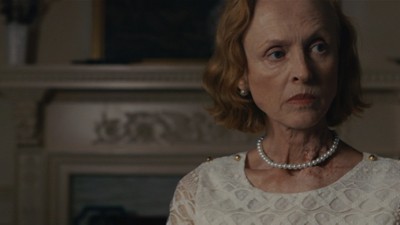 Another day, another found-footage horror film, right? A common theme persists in the criticisms tossed at recent unsuccessful entries into the sub-genre: there's untapped potential in the concept and it's still capable of spooking an audience, but filmmakers aren't willing to branch out from the cliches and formula to get their hands dirty with something inventive. The persistence of those impressions might lead one to think that, no, there really isn't this promise buried underneath the shaky cameras, the moronic characters, and the jump-scares fabricated from mundane sounds. Then, a film like Adam Robitel's The Taking of Deborah Logan comes along, confirming that a dash of innovation and the gusto to break those rules that have somehow formed over the past fifteen years can yield something similarly disturbing yet measurably original. It's not free of some of those proclivities, but it takes steps to ensure that this wouldn't play out like every other found-footage piece of work you've seen before.
Another day, another found-footage horror film, right? A common theme persists in the criticisms tossed at recent unsuccessful entries into the sub-genre: there's untapped potential in the concept and it's still capable of spooking an audience, but filmmakers aren't willing to branch out from the cliches and formula to get their hands dirty with something inventive. The persistence of those impressions might lead one to think that, no, there really isn't this promise buried underneath the shaky cameras, the moronic characters, and the jump-scares fabricated from mundane sounds. Then, a film like Adam Robitel's The Taking of Deborah Logan comes along, confirming that a dash of innovation and the gusto to break those rules that have somehow formed over the past fifteen years can yield something similarly disturbing yet measurably original. It's not free of some of those proclivities, but it takes steps to ensure that this wouldn't play out like every other found-footage piece of work you've seen before.
Instead of investigating the paranormal, The Taking of Deborah Logan hinges on research of something much more grounded: Alzheimer's disease. It starts as a PhD thesis documentary on the progression of the disease in someone, Deborah Logan (Jill Larson), on the cusp between stages, with a crew of three being invited out to their home by Deborah's daughter and caretaker, Sarah (Anne Ramsay). Cameras are situated throughout the house to monitor Deborah's erratic movements and showcase her memory issues, while a two-man sound and camera crew assist Mia (Michelle Ang) in interviewing her about her prior life and her struggles. Things escalate surprisingly quickly with Deborah's condition, leading her to act in bizarre, despondent ways as her physical and emotional condition degrade. Some of her actions, however, start to have little to no logical explanation, increasing in bizarreness and volatility as the documentary crew and doctors struggle to make sense of it all ... and the answers start to point towards Deborah's past and forces beyond the realm of science.
The process of viewing found-footage horror differs between people: some simply watch the events unfold like any other movie, while others get wrapped up in the immersion of the situation's "reality". The Taking of Deborah Logan shakes up this pattern by crafting a scenario where mysterious, supernatural events are the furthest thing from what's expected,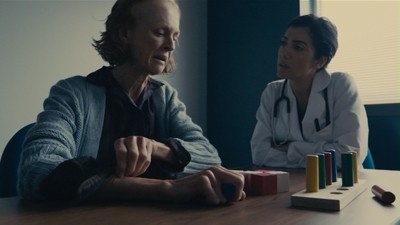 aside from the meta level of those who have seen the film's promo materials. In The Blair Witch Project, the crew knows they're entering the witch's domain. In Willow Creek, the couple knows they're trekking through Bigfoot's stomping grounds. Here, there's the expectation of the complications that follow Alzheimer's -- confusion, aggression, dementia -- but never does the possibility of the paranormal impact their assessment of the situation at first. That makes the emergence of the film's darker elements that much more potent and relatively surprising, informed by the escalating discomfort of the crew as they reassess their circumstances, making the captured footage feel fresh and alive.
aside from the meta level of those who have seen the film's promo materials. In The Blair Witch Project, the crew knows they're entering the witch's domain. In Willow Creek, the couple knows they're trekking through Bigfoot's stomping grounds. Here, there's the expectation of the complications that follow Alzheimer's -- confusion, aggression, dementia -- but never does the possibility of the paranormal impact their assessment of the situation at first. That makes the emergence of the film's darker elements that much more potent and relatively surprising, informed by the escalating discomfort of the crew as they reassess their circumstances, making the captured footage feel fresh and alive.
The Taking of Deborah Logan doesn't just drop the footage in the audience's lap in a raw duct-taped format, either: it's been edited together into a makeshift documentary on the peculiar events that transpired, complete with formal interviews and archived material from the '70s. That allows writer/director Robitel to trim the fat of what the crew captured, producing a concise, intensely-paced supernatural thriller covering several months instead of a twenty-four hour period. While still relying on superfluous sound effects to rattle the audience -- the usage of digital interference and loud transition blips between cameras gets obnoxious -- Robitel skillfully declines the setting into a house of trepidation, where Deborah's vacant shuffles between rooms exist in the murky area between anomalous Alzheimer's symptoms and something more malicious. The characters' insecure interpretation of the ambiguity between the condition's aggressiveness and ... something else adds an intriguing layer, perhaps a willfully ignorant one on occasions, coupled with the drama of Susan Logan coping with her mother's worsening state.
These efforts might've been wasted had the actress playing Deborah Logan not been as malleable and unsettling to behold as Jill Larson, a role that demands a lot from the actress. A complete portrait of Deb's transformation takes shape through her performance, from the delicate and debonair woman seen raking leaves upon her introduction to a craggy, unpredictable, almost-feral beast of a person as her ... uh, ailment takes hold. Larson delivers those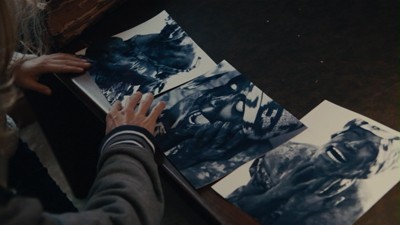 disturbing internal twists without a snag, the eeriness of her severe eyes and the agitation of her body language intensifying with each slight jump in time and every encounter throughout the house. She also has the very capable Anne Ramsay responding to those shifts in personality as her daughter, offering a boozy, worn-out yet resilient protagonist harboring a number of subtle layers. Their talents craft a convincing rapport that underscores the dramatic necessities of the story, the struggle with medical abnormalities and a lack of control, shaping Deborah's dangerous plummet into more than just a macabre curiosity.
disturbing internal twists without a snag, the eeriness of her severe eyes and the agitation of her body language intensifying with each slight jump in time and every encounter throughout the house. She also has the very capable Anne Ramsay responding to those shifts in personality as her daughter, offering a boozy, worn-out yet resilient protagonist harboring a number of subtle layers. Their talents craft a convincing rapport that underscores the dramatic necessities of the story, the struggle with medical abnormalities and a lack of control, shaping Deborah's dangerous plummet into more than just a macabre curiosity.
The Taking of Deborah Logan takes on a different attitude once the other-worldly creeps into the story, increasing in pace as the panic escalates around Deb and the danger she poses to both herself and those around her. Driven by brusque edits and careful usage of shaky camerawork, director Robitel reveals a strong grasp on the genre as he cleverly breaks from the probabilities of other found-footage films, from the willingness of the researchers to bail on the project to the lack of safety zones even in public. The secrets behind Deb's condition transform into a maze of revelations that intentionally makes only limited sense, ultimately leading into a chaotic final act that doesn't shy from pushing boundaries and shedding blood amid the nonsensical mayhem, all while retaining a grasp on the drama behind the Logan family's bout with Alzheimer's. Navigating the unsolved labyrinth of Deborah's deteriorating mind ends up being enough of a variable to take the staleness of the genre down inspired, unpredictable paths.
The DVD:
Video and Audio:
As with most "organic" found-footage horror films, The Taking of Deborah Logan fluctuates in quality depending on the source of the recordings used, often showcasing a lot of garbled details and aggressive noise through the concealed security cams. For the most part, everything looks appropriate to the film's intentions in Millenium's 1.78:1-framed, widescreen-enhanced transfer, mostly dominated by crisp, if dim HD footage around the Logan household. Skin tones are warm and responsive in its solid moments, sporting impressive depth and detail for a standard-definition source. There are, however, some heavy issues with shimmering at several points: some are as subtle as the rim of a wheelbarrow revealing some aliasing, but there's one scene in particular where the moire effect moves around with the entirety of the house. Those objectionable moments are few and far between, though, and don't detract from the merits of the intentionally erratic visual style.
Sound design becomes surprisingly integral in The Taking of Deborah Logan, underscoring both loud thuds from upstairs rooms to the subtle clank of a gold cross and chain on a windowsill, and the Dolby Digital 5.1 track scares up a thrilling surround stage for the numerous constrained environments. Much like the visuals, the sound elements are contingent on the authentic presentation of how they're captured scene-by-scene, but the track never runs into any problems with inaudible dialogue or abrasive distortion, frequently razor-sharp and articulate as it follows Deborah's proper shakiness and the crew's miscellaneous comments in the background. The surround channels see frequent activity through the rattling of a chandelier, the sharp transition sounds between cameras, and the incredibly loud ringing of a vintage phone, while the subtle sounds of a garden shovel digging into dirt and the creaks of floorboards are natural and pleasing. It's an atmospheric and suitable track.
Special Features:
We're only working with one brief extra, Making of The Taking of Deborah Logan (3:35, 16x9), featuring quick interviews with Adam Robitel, Jill Larson, and the rest of the cast in between clips from the film. It's quick and fluffy, but you can pick up on the director's enthusiasm and the actors' dedication.
Final Thoughts:
The Taking of Deborah Logan actively strives to split from the found-footage subgenre's idiosyncrasies, working to take the formula in unforeseeable directions within a challenging and creative premise. Using the gray-area of an aggressive medical condition as a disguise for the supernatural, especially one that impact neurological function like Alzheimer's disease, yields a setting that's constantly hinged on the characters' interpretation and apprehension over the dangers posed by the victim -- here, a strong-willed yet seemingly delicate older woman. Jill Larson telegraphs a incline of grotesque fury and disturbance as Deborah Logan, and the setting's eeriness and volatility escalates right along with her through the surveillance and handheld footage captured by a medical doc's crew. It's still reliant on the general concept's architecture and defaults to unnecessary scare tactics to jostle the audience, but the output easily shapes into a paranormal thriller that's divergent enough to be worth seeking out. Strongly Recommended.
Thomas Spurlin, Staff Reviewer -- DVDTalk Reviews | Personal Blog/Site
 Another day, another found-footage horror film, right? A common theme persists in the criticisms tossed at recent unsuccessful entries into the sub-genre: there's untapped potential in the concept and it's still capable of spooking an audience, but filmmakers aren't willing to branch out from the cliches and formula to get their hands dirty with something inventive. The persistence of those impressions might lead one to think that, no, there really isn't this promise buried underneath the shaky cameras, the moronic characters, and the jump-scares fabricated from mundane sounds. Then, a film like Adam Robitel's The Taking of Deborah Logan comes along, confirming that a dash of innovation and the gusto to break those rules that have somehow formed over the past fifteen years can yield something similarly disturbing yet measurably original. It's not free of some of those proclivities, but it takes steps to ensure that this wouldn't play out like every other found-footage piece of work you've seen before.
Another day, another found-footage horror film, right? A common theme persists in the criticisms tossed at recent unsuccessful entries into the sub-genre: there's untapped potential in the concept and it's still capable of spooking an audience, but filmmakers aren't willing to branch out from the cliches and formula to get their hands dirty with something inventive. The persistence of those impressions might lead one to think that, no, there really isn't this promise buried underneath the shaky cameras, the moronic characters, and the jump-scares fabricated from mundane sounds. Then, a film like Adam Robitel's The Taking of Deborah Logan comes along, confirming that a dash of innovation and the gusto to break those rules that have somehow formed over the past fifteen years can yield something similarly disturbing yet measurably original. It's not free of some of those proclivities, but it takes steps to ensure that this wouldn't play out like every other found-footage piece of work you've seen before. Instead of investigating the paranormal, The Taking of Deborah Logan hinges on research of something much more grounded: Alzheimer's disease. It starts as a PhD thesis documentary on the progression of the disease in someone, Deborah Logan (Jill Larson), on the cusp between stages, with a crew of three being invited out to their home by Deborah's daughter and caretaker, Sarah (Anne Ramsay). Cameras are situated throughout the house to monitor Deborah's erratic movements and showcase her memory issues, while a two-man sound and camera crew assist Mia (Michelle Ang) in interviewing her about her prior life and her struggles. Things escalate surprisingly quickly with Deborah's condition, leading her to act in bizarre, despondent ways as her physical and emotional condition degrade. Some of her actions, however, start to have little to no logical explanation, increasing in bizarreness and volatility as the documentary crew and doctors struggle to make sense of it all ... and the answers start to point towards Deborah's past and forces beyond the realm of science.
The process of viewing found-footage horror differs between people: some simply watch the events unfold like any other movie, while others get wrapped up in the immersion of the situation's "reality". The Taking of Deborah Logan shakes up this pattern by crafting a scenario where mysterious, supernatural events are the furthest thing from what's expected,
 aside from the meta level of those who have seen the film's promo materials. In The Blair Witch Project, the crew knows they're entering the witch's domain. In Willow Creek, the couple knows they're trekking through Bigfoot's stomping grounds. Here, there's the expectation of the complications that follow Alzheimer's -- confusion, aggression, dementia -- but never does the possibility of the paranormal impact their assessment of the situation at first. That makes the emergence of the film's darker elements that much more potent and relatively surprising, informed by the escalating discomfort of the crew as they reassess their circumstances, making the captured footage feel fresh and alive.
aside from the meta level of those who have seen the film's promo materials. In The Blair Witch Project, the crew knows they're entering the witch's domain. In Willow Creek, the couple knows they're trekking through Bigfoot's stomping grounds. Here, there's the expectation of the complications that follow Alzheimer's -- confusion, aggression, dementia -- but never does the possibility of the paranormal impact their assessment of the situation at first. That makes the emergence of the film's darker elements that much more potent and relatively surprising, informed by the escalating discomfort of the crew as they reassess their circumstances, making the captured footage feel fresh and alive. The Taking of Deborah Logan doesn't just drop the footage in the audience's lap in a raw duct-taped format, either: it's been edited together into a makeshift documentary on the peculiar events that transpired, complete with formal interviews and archived material from the '70s. That allows writer/director Robitel to trim the fat of what the crew captured, producing a concise, intensely-paced supernatural thriller covering several months instead of a twenty-four hour period. While still relying on superfluous sound effects to rattle the audience -- the usage of digital interference and loud transition blips between cameras gets obnoxious -- Robitel skillfully declines the setting into a house of trepidation, where Deborah's vacant shuffles between rooms exist in the murky area between anomalous Alzheimer's symptoms and something more malicious. The characters' insecure interpretation of the ambiguity between the condition's aggressiveness and ... something else adds an intriguing layer, perhaps a willfully ignorant one on occasions, coupled with the drama of Susan Logan coping with her mother's worsening state.
These efforts might've been wasted had the actress playing Deborah Logan not been as malleable and unsettling to behold as Jill Larson, a role that demands a lot from the actress. A complete portrait of Deb's transformation takes shape through her performance, from the delicate and debonair woman seen raking leaves upon her introduction to a craggy, unpredictable, almost-feral beast of a person as her ... uh, ailment takes hold. Larson delivers those
 disturbing internal twists without a snag, the eeriness of her severe eyes and the agitation of her body language intensifying with each slight jump in time and every encounter throughout the house. She also has the very capable Anne Ramsay responding to those shifts in personality as her daughter, offering a boozy, worn-out yet resilient protagonist harboring a number of subtle layers. Their talents craft a convincing rapport that underscores the dramatic necessities of the story, the struggle with medical abnormalities and a lack of control, shaping Deborah's dangerous plummet into more than just a macabre curiosity.
disturbing internal twists without a snag, the eeriness of her severe eyes and the agitation of her body language intensifying with each slight jump in time and every encounter throughout the house. She also has the very capable Anne Ramsay responding to those shifts in personality as her daughter, offering a boozy, worn-out yet resilient protagonist harboring a number of subtle layers. Their talents craft a convincing rapport that underscores the dramatic necessities of the story, the struggle with medical abnormalities and a lack of control, shaping Deborah's dangerous plummet into more than just a macabre curiosity. The Taking of Deborah Logan takes on a different attitude once the other-worldly creeps into the story, increasing in pace as the panic escalates around Deb and the danger she poses to both herself and those around her. Driven by brusque edits and careful usage of shaky camerawork, director Robitel reveals a strong grasp on the genre as he cleverly breaks from the probabilities of other found-footage films, from the willingness of the researchers to bail on the project to the lack of safety zones even in public. The secrets behind Deb's condition transform into a maze of revelations that intentionally makes only limited sense, ultimately leading into a chaotic final act that doesn't shy from pushing boundaries and shedding blood amid the nonsensical mayhem, all while retaining a grasp on the drama behind the Logan family's bout with Alzheimer's. Navigating the unsolved labyrinth of Deborah's deteriorating mind ends up being enough of a variable to take the staleness of the genre down inspired, unpredictable paths.
The DVD:
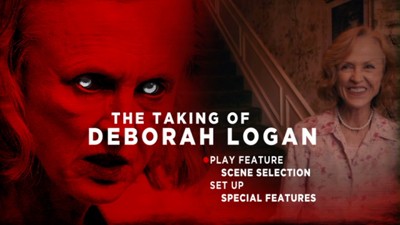 | 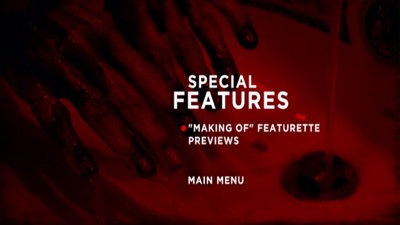 |
Video and Audio:
As with most "organic" found-footage horror films, The Taking of Deborah Logan fluctuates in quality depending on the source of the recordings used, often showcasing a lot of garbled details and aggressive noise through the concealed security cams. For the most part, everything looks appropriate to the film's intentions in Millenium's 1.78:1-framed, widescreen-enhanced transfer, mostly dominated by crisp, if dim HD footage around the Logan household. Skin tones are warm and responsive in its solid moments, sporting impressive depth and detail for a standard-definition source. There are, however, some heavy issues with shimmering at several points: some are as subtle as the rim of a wheelbarrow revealing some aliasing, but there's one scene in particular where the moire effect moves around with the entirety of the house. Those objectionable moments are few and far between, though, and don't detract from the merits of the intentionally erratic visual style.
Sound design becomes surprisingly integral in The Taking of Deborah Logan, underscoring both loud thuds from upstairs rooms to the subtle clank of a gold cross and chain on a windowsill, and the Dolby Digital 5.1 track scares up a thrilling surround stage for the numerous constrained environments. Much like the visuals, the sound elements are contingent on the authentic presentation of how they're captured scene-by-scene, but the track never runs into any problems with inaudible dialogue or abrasive distortion, frequently razor-sharp and articulate as it follows Deborah's proper shakiness and the crew's miscellaneous comments in the background. The surround channels see frequent activity through the rattling of a chandelier, the sharp transition sounds between cameras, and the incredibly loud ringing of a vintage phone, while the subtle sounds of a garden shovel digging into dirt and the creaks of floorboards are natural and pleasing. It's an atmospheric and suitable track.
Special Features:
We're only working with one brief extra, Making of The Taking of Deborah Logan (3:35, 16x9), featuring quick interviews with Adam Robitel, Jill Larson, and the rest of the cast in between clips from the film. It's quick and fluffy, but you can pick up on the director's enthusiasm and the actors' dedication.
Final Thoughts:
The Taking of Deborah Logan actively strives to split from the found-footage subgenre's idiosyncrasies, working to take the formula in unforeseeable directions within a challenging and creative premise. Using the gray-area of an aggressive medical condition as a disguise for the supernatural, especially one that impact neurological function like Alzheimer's disease, yields a setting that's constantly hinged on the characters' interpretation and apprehension over the dangers posed by the victim -- here, a strong-willed yet seemingly delicate older woman. Jill Larson telegraphs a incline of grotesque fury and disturbance as Deborah Logan, and the setting's eeriness and volatility escalates right along with her through the surveillance and handheld footage captured by a medical doc's crew. It's still reliant on the general concept's architecture and defaults to unnecessary scare tactics to jostle the audience, but the output easily shapes into a paranormal thriller that's divergent enough to be worth seeking out. Strongly Recommended.
|
| Popular Reviews |
| Sponsored Links |
|
|
| Sponsored Links |
|
|
| Release List | Reviews | Shop | Newsletter | Forum | DVD Giveaways | Blu-Ray | Advertise |
|
Copyright 2024 DVDTalk.com All Rights Reserved. Legal Info, Privacy Policy, Terms of Use,
Manage Preferences,
Your Privacy Choices | |||||||













